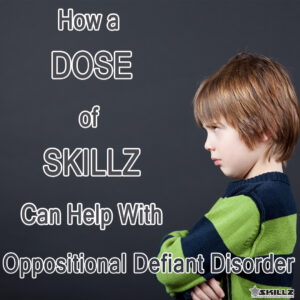 All children act out from time to time. However, children with Oppositional Defiant Disorder (ODD), as defined by the Child Mind Institute, “have a well-established pattern of behavior problems that are more extreme than their peers.” Children with ODD display aggressive behaviors and have a hard time recognizing social cues. To diagnose, the behaviors are generally assessed by tracking the severity of them and the length of time they are present.
All children act out from time to time. However, children with Oppositional Defiant Disorder (ODD), as defined by the Child Mind Institute, “have a well-established pattern of behavior problems that are more extreme than their peers.” Children with ODD display aggressive behaviors and have a hard time recognizing social cues. To diagnose, the behaviors are generally assessed by tracking the severity of them and the length of time they are present.
The exact cause of ODD is unknown. However, there often appears to be a link to genetic factors including a family history of mental disorders, biological factors that might include a brain injury or chemical imbalance, and environmental factors such as an unstable family life, inconsistent discipline by parents, abuse, or violence in the community.
The most effective treatment to manage symptoms of ODD has been cognitive-behavioral therapy. This type of therapy is very structured and can help with a specific problem such as helping a child learn a different way of thinking and assist them with problem solving. It is behaviorally centered and geared to a child’s age. Parents are also trained to help their children manage symptoms.
Over the years, martial arts has been a resource for some parents when dealing with various behavioral problems with their children. And while the structure of a traditional martial arts program is helpful, the SKILLZ program has taken it even further by creating a system that focuses on the whole child. This program utilizes knowledge of the science and psychology of child development, the chemicals in the brain, and brain-based learning techniques. In addition, the SKILLZ program has supplemental curriculums including Life SKILLZ and Parent SKILLZ.
The SKILLZ program applies a 4-D method of teaching in each age specific class. This means that the children in each class are taught according to their specific age. In addition, each child’s physical, intellectual, emotional, and social development is focused on. The program is very structured yet gives the instructors the tools to help each student with their individual needs…the very foundation of what children with ODD can benefit from.
Another important approach that is used in the SKILLZ program classes is that of the D.O.S.E. method which applies small ways of boosting dopamine, oxytocin, serotonin, and endorphins in the brain. Since a possible source of symptoms in children with ODD is a chemical imbalance, this tactic can help enhance the balance of chemicals. For example, since the release of oxytocin is a learned response and is released when children feel love and trust, a simple high five, from an instructor, for a job well done in class can help them feel more secure. This is especially important for children with ODD since positive adult interactions may be something they don’t experience often.
A final piece to helping manage symptoms of ODD is parent training. Since this disorder can be extremely exhausting to cope with, helping parents learn effective methods will benefit everyone. The supplemental Parent SKILLZ knowledge provides information and tools to parents to assess where they are with the 8 skills of the program and ways to help them improve. The eight skills include connection, attunement, patience, prompting, edutainment, nurturing, adaptability, and consistency. When applied, these methods can be very effective.
When working with children with ODD it is important for everyone involved to be as consistent as possible. It is a team effort between parents, teachers, and coaches to provide the this. Appropriate discipline strategies and therapy can aid in alleviating symptoms of ODD. Supplemental programs, such as the SKILLZ program, can offer an additional resource of support as well.





